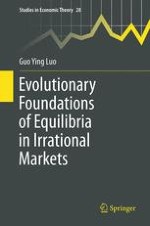
2012 | OriginalPaper | Buchkapitel
1. Introduction
verfasst von : Guo Ying Luo
Erschienen in: Evolutionary Foundations of Equilibria in Irrational Markets
Verlag: Springer New York
Aktivieren Sie unsere intelligente Suche, um passende Fachinhalte oder Patente zu finden.
Wählen Sie Textabschnitte aus um mit Künstlicher Intelligenz passenden Patente zu finden. powered by
Markieren Sie Textabschnitte, um KI-gestützt weitere passende Inhalte zu finden. powered by